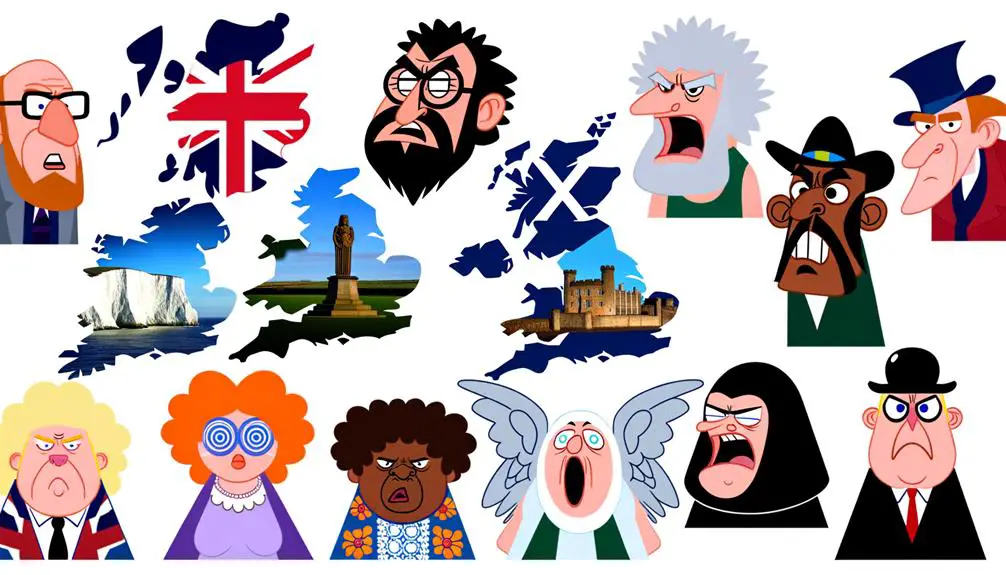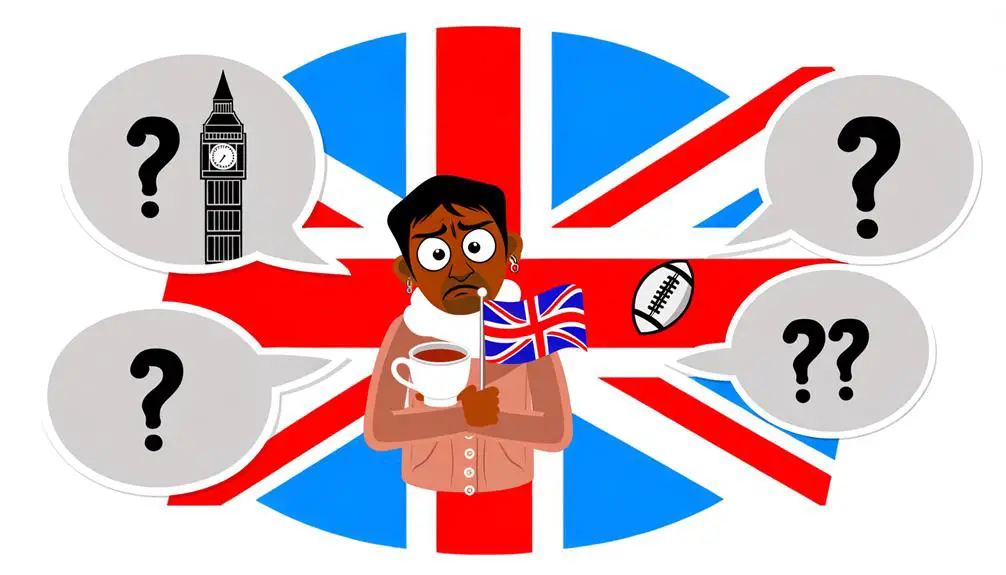In British slang, "tosser" is a derogatory term that reflects deep socio-cultural contexts and language evolution within the UK. It originated to describe a contemptible person, evolving beyond its literal meaning to embody negative attributes indicative of an individual's actions or behavior. This linguistic adaptation showcases societal attitude shifts, underlining the interplay between language, culture, and society. Grasping the complexity of "tosser" isn't just about the word itself, but also understanding its potency and nuances across different settings. Your comprehension of British slang will deepen as you explore the varying dimensions and implications of terms like "tosser."
Key Takeaways
- 'Tosser' is a derogatory British slang term used to insult someone's intelligence or behavior.
- It originally referred to someone engaging in a solitary sexual act but has evolved to imply foolishness or contemptibility.
- The term reflects broader socio-cultural attitudes and can signify disdain or mockery in various contexts.
- While common in British vernacular, 'tosser' carries different levels of offensiveness depending on the audience and setting.
- Its usage in media and conversation showcases the dynamic nature of slang and its ability to reflect and influence societal norms.
Understanding British Slang

Diving into British slang reveals a rich tapestry of linguistic evolution, where each term encapsulates not just a unique meaning but an insight into the culture and social dynamics of the UK. Understanding the etymology of slang is essential; it's akin to uncovering the layers of history that shape present-day vernacular. Slang etymology, particularly in the UK, is a complex interweaving of socio-political changes, migrations, and the creative playfulness of language. Each slang term, including 'tosser,' serves as a linguistic snapshot, capturing the essence of the era and the socio-cultural contexts from which it emerged.
However, while enriching, the proliferation of slang also erects communication barriers, particularly for those not steeped in British culture. For outsiders, British slang can seem like an impenetrable code, a series of linguistic hurdles that obscure rather than elucidate meaning. This barrier is not just linguistic but cultural, requiring not only a grasp of the words themselves but an understanding of the contexts in which they are used. The challenge, then, for anyone looking to fully engage with British culture, is not just in learning the slang, but in traversing the intricate layers of meaning and historical resonance that each term carries.
The Origins of 'Tosser'
You'll find that the term 'tosser' has roots deeply embedded in British linguistic culture, originating in a context that reflects both historical social practices and linguistic evolution. Its journey from early usage to contemporary interpretations showcases a dynamic shift in societal attitudes and language adaptation. Analyzing this trajectory offers insights into how language mirrors changes in societal values and norms over time.
Early Usage Context
To understand the early usage context of the term 'tosser,' it's important to explore its origins in British slang, where it first appeared as a derogatory expression. A linguistic analysis reveals that 'tosser' emerged from the vernacular of the working-class, encapsulating not just an insult but a reflection of social dynamics and attitudes of the time. The term was initially used to scorn individuals considered to be of low moral standing or those engaging in behavior deemed socially unacceptable. This early usage underlines the social implications of language, illustrating how slang terms can both mirror and perpetuate societal values and prejudices. Hence, 'tosser' serves as a case study in the complex interplay between language, society, and cultural norms.
Evolution Over Time
Exploring the evolution of 'tosser' reveals how societal attitudes and linguistic practices have intertwined to shape the term's journey from pejorative to a more nuanced expression in contemporary British English. Tosser's etymology is deeply rooted in British slang, originating as a derogatory term linked to masturbation, thereby implying someone is a fool or incompetent. Over time, the harshness of its initial connotation has somewhat softened, reflecting changes in social norms and the fluidity of language. This slang evolution is indicative of the broader linguistic phenomenon where words undergo semantic change, adapting to new contexts and attitudes. As 'tosser' evolved through the decades, its application broadened, showcasing the dynamic nature of slang and its capacity to mirror societal changes and cultural attitudes.
Current Interpretations
Delving into the current interpretations of 'tosser,' it's evident that this term's origins provide insightful reflections on its semantic journey within British cultural discourse. The evolution from a derogatory insinuation to a more widely recognized slang term underscores its flexibility and resilience in linguistic adaptation. This transformation is pivotal for its slang popularity and international understanding.
| Aspect | Detail |
|---|---|
| Slang Popularity | High within British vernacular, emerging globally |
| International Understanding | Growing, with variations in acceptance |
The term's journey from the shadows of vulgarity to a place of common linguistic currency showcases the dynamic nature of language, especially within the domains of slang. Its acceptance into broader circles highlights not just a linguistic shift but a cultural one, suggesting a more nuanced comprehension of its implications and usage.
'Tosser': Definition and Usage
One might find the term 'tosser' frequently encountered in British vernacular, where it serves as a derogatory slang expression denoting a person of contemptible or foolish character. This term, deeply embedded in the socio-linguistic landscape of the UK, offers a window into the dynamics of language evolution and its social impact. The evolution of 'tosser' within the English language mirrors broader societal shifts, reflecting changing attitudes towards both the expression of disdain and the characteristics deemed vital of such censure. Originally rooted in the more literal actions that the word might suggest, its usage has transcended these origins to encapsulate a broader range of negative attributes, from incompetence to moral bankruptcy.
The social impact of 'tosser' and similar slang is significant, serving not only as a linguistic tool for insult but also as a means of enforcing social norms and hierarchies. By labeling someone a 'tosser,' the speaker invokes a shared understanding of social values and boundaries, reinforcing community cohesion at the expense of the individual targeted. This dynamic underscores the power of language not just to communicate but to shape social realities, making the study of terms like 'tosser' vital for understanding the interplay between language, culture, and society.
Variations of 'Tosser'

You'll find that 'tosser' isn't a static term; its origins, while rooted in British vernacular, stretch back to nuanced socio-linguistic contexts that define its evolution. The exploration of regional slang differences uncovers a tapestry of local identities and cultural attitudes that shape the term's usage and perceived severity. Additionally, understanding similar insulting terms affords a broader comprehension of the lexicon of British insults, highlighting a complex interplay of language, culture, and societal norms.
Origins of 'Tosser'
Tracing back to its etymological roots, the term 'tosser' emerges from variations in British slang, reflecting shifts in linguistic and cultural landscapes over time. You'll find that the linguistic origins of 'tosser' dive into the rich tapestry of English slang etymology, where words morph and adapt, carrying nuances that mirror societal changes. This exploration into the origins of 'tosser' isn't just about tracking a word's birth but understanding how language evolves to capture the essence of its time. Slang, in its very nature, serves as a living, breathing historical record, and 'tosser' is no exception. It's a proof of how verbal expressions are repurposed and reshaped, moving from marginal to mainstream, and sometimes vice versa, within the fluid dynamics of spoken English.
Regional Slang Differences
Exploring the regional slang differences reveals that 'tosser' isn't just a uniform term across the UK; its connotations and usage can greatly vary, reflecting the diverse linguistic landscape of the region. The richness of dialectical humor plays a significant role in these variations. In some areas, 'tosser' is laced with a playful undertone, a ribbing among friends rather than a harsh insult. This variation is often lost in translation without an understanding of the local dialect's nuances. Pronunciation differences further complicate its uniform understanding. In certain accents, the term might roll off the tongue more harshly, imbuing it with a more severe connotation, whereas in others, it's softened, almost diluted in its potential to offend. This showcases the complexity of regional slang and its impact on language interpretation.
Similar Insulting Terms
In the domain of British slang, 'tosser' is but one among a plethora of similarly disparaging terms, each with its own nuanced implications and contexts. When delving into insult comparison, it's important to recognize the subtle yet significant differences that distinguish 'tosser' from its offensive alternatives. For instance, 'wanker,' while seemingly interchangeable, often carries a slightly more contemptuous tone, implying not just foolishness but also a degree of self-absorption. Similarly, 'git' suggests obnoxiousness combined with stupidity, a shade different from the general incompetence suggested by 'tosser.' Additionally, 'plonker' infuses a hint of endearment into the insult, often used more affectionately among friends. Each term, thus, serves a distinct communicative purpose, reflecting the rich tapestry of British colloquial expressions.
Cultural Context and Sensitivity

Understanding the cultural context and sensitivity surrounding the term 'tosser' is essential, as it reveals the intricate ways in which language reflects societal attitudes and norms. The evolution of language and its social implications are pivotal in understanding how certain words gain their meanings and the potential impact they have when used in various contexts. 'Tosser' is more than just a casual insult; it's a window into the complex interplay between language, culture, and societal values.
| Aspect | Detail |
|---|---|
| Language Evolution | 'Tosser' has evolved from a strictly derogatory term to one with nuanced uses, reflecting changes in societal attitudes. |
| Social Implications | Its use can signify in-group belonging or mark social boundaries, impacting social dynamics and perceptions. |
| Cultural Sensitivity | Awareness of the term's potency and offensive nature is crucial in diverse settings to avoid cultural insensitivity. |
| Regional Variations | The term's acceptability and perceived offensiveness can vary significantly across different English-speaking cultures. |
| Contextual Usage | Depending on context, 'tosser' can range from playful banter to a serious insult, emphasizing the importance of understanding its implications. |
This analysis underscores the importance of being mindful of the words we choose, reflecting broader cultural and societal underpinnings.
In Popular British Media
Reflecting on the cultural and societal layers of 'tosser' offers a foundation to examine its representation and nuanced roles within popular British media. This term, layered with connotations, navigates a complex path between casual vernacular and potential offensiveness, shaped importantly by the context in which it's used. British media, with its global reach, plays a vital role in disseminating and contextualizing slang, with 'tosser' being no exception.
Celebrity endorsements have remarkably shifted the perception of 'tosser', often using it in jest or affection in a manner that dilutes its harshness. When celebrities, revered in British culture, incorporate such slang into their public lexicon, it fosters a normalization process. This usage can subtly alter its connotations, making it more palatable to a broader audience.
Conversely, media censorship plays a pivotal role in maintaining the term's edge. Regulatory bodies and broadcasters often grapple with the appropriateness of 'tosser' in content, leading to its strategic omission or alteration in certain contexts. This balance between endorsement and censorship underscores the dynamic nature of slang within media, illustrating how societal norms and media regulations intersect to influence language evolution.
When to Use 'Tosser' Appropriately

Understanding the appropriate contexts for using 'tosser' requires a nuanced grasp of its cultural implications and the sensitivity of the audience. This term, deeply entrenched in British slang, carries a weight of connotations that can markedly shape public reactions. It's crucial, then, to approach its use with a level of discernment that respects the boundaries of politeness and cultural sensitivity.
In evaluating when its application is fitting, consider the setting and the company you're in. Casual, informal gatherings among close friends who share a mutual understanding of the term's playful use might deem it appropriate. However, its deployment in professional environments or among acquaintances may not only be considered inappropriate but could also potentially offend, given its derogatory underpinnings.
Moreover, the public reactions to 'tosser' can vary widely based on regional sensitivities within the UK itself. What might pass as light-hearted banter in one area could be perceived as outright rudeness in another. Hence, it's critical to gauge the social climate and the individuals' familiarity with British slang before using such terms. This strategic approach ensures that communication remains respectful, preventing unintended offense and fostering a positive dialogic environment.
Misinterpretations and Clarifications
Given the nuanced use of 'tosser' within various contexts, it's important to address common misinterpretations and offer clarifications to guarantee its meaning is accurately conveyed. The term, deeply embedded in British slang, has evolved substantially over time, reflecting broader shifts in language evolution. Initially considered highly derogatory, its use has somewhat softened, but it still can carry a strong negative connotation, highlighting the need for careful consideration in its application.
Understanding 'tosser' requires an appreciation for the subtleties of British humor and the social impact of slang. Its misuse, especially by those unfamiliar with the depth of its implications, can lead to significant misunderstandings. For instance, while it might be used among friends in a jocular manner, employing it in more formal or unfamiliar settings can result in offense or confusion. Grasping the context in which it's appropriate to use 'tosser' is as essential as understanding the word itself.
Moreover, the term's adaptability underscores the dynamic nature of language, where meanings shift with societal attitudes. By staying informed on these nuances, you're better equipped to navigate the complexities of British slang, ensuring that your use of 'tosser' is both appropriate and understood in its intended context.







